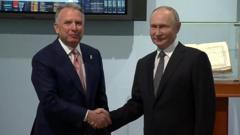In the face of tariffs imposed by the U.S. under President Trump, Taiwanese small manufacturers are preparing for potential disruptions in their export business. Uncertainty surrounding trade policies is exacerbating the situation, forcing firms to rethink supply chains and customer relations.
Uncertainty in Taiwan's Export Sector: Navigating Tariffs and Global Market Challenges

Uncertainty in Taiwan's Export Sector: Navigating Tariffs and Global Market Challenges
Taiwanese small manufacturers are grappling with the effects of U.S. tariffs and the unpredictability of trade policies under President Trump, significantly affecting their operations and prospects.
Since the announcement of tariffs by President Trump, small manufacturers in Taiwan have found themselves in a precarious position. Alex Tang, who oversees a lathe-making factory named Aegis CNC in Taichung, conveys the challenges faced by his business, highlighting the tension felt by many in Taiwan’s export-reliant manufacturing sector. While a temporary suspension on most tariffs provided a brief respite, the looming 10 percent tariffs on many products continue to create anxiety among Taiwanese exporters.
The unpredictability of trade dialogue leaves Tang and his employees bracing for potential downturns. “It’s the butterfly effect,” he states, explaining that the ramifications reach beyond those companies directly trading with the United States. Even businesses not exporting directly to the U.S., like Aegis CNC, are feeling the strain. U.S. traders sourcing from Taiwan are halting orders as they assess the situation, escalating the burden of uncertainty.
During two days of interviews conducted in the heart of Taiwan's manufacturing landscape, anecdotes emerged reflecting a shared sentiment among local business leaders: while tariffs add to operating costs, the consistent uncertainty surrounding future trade policy could be just as damaging. Furthermore, heightened competition from Chinese exporters, previously closed out of the U.S. market by adequate tariffs, poses additional challenges as they seek alternative markets.
Even Taiwan’s government acknowledges the impact of U.S. trade decisions. President Lai Ching-te recently held discussions with Taichung manufacturers to address the ramifications of these tariffs. As Taiwan navigates this complex environment, its small factories are a testament to resilience, relying on their ability to adapt and remain flexible amid a landscape marked by unpredictability. As manufacturers like Aegis CNC brace for potential shifts in trade policy, their emphasis on frugality and flexibility will be critical to surviving the turbulent waters of global trade.























